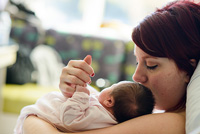|
 Who comforts better than mom?
Who comforts better than mom?
By Laura Corsig, IBCLC
Want to learn more?
To learn more about our maternity services or to find an ob-gyn, please call:
704-384-CARE (2273) |
After giving birth, the practice of rooming in provides the best start for you and your baby. Bonding with your new baby in a nurturing, family environment is important right from the beginning.
"Rooming in" means you and your baby will be together in the hospital, unless there is a medical reason either of you needs to receive care separately. Research proves mother and baby do better together, and as a lactation consultant, I see the value of rooming in every day. Babies who room in cry less and feed better, and mothers who room in are calmer and better prepared to care for their baby at home.
The concept of rooming in has been around since childbirth moved out of homes and into hospitals. Rooming in gained popularity in the 1940s when research proved that babies who were cared for in mothers’ rooms were less at risk of infections spread in nurseries. In the 1970s, when birthrates declined, some hospitals marketed childbirth as a “week’s vacation” to weary mothers, encouraging mothers to send babies to “state-of-the-art” newborn nurseries. There, nurses were trained, often by formula sales representatives, to bottle feed babies formula so new mothers would not be interrupted by their babies.
 Today, hospitals worldwide are working to improve maternity practices, and rooming in is reemerging because of its positive effects on breastfeeding and on maternal confidence. The World Health Organization (WHO) recommends hospitals follow “Ten Steps to Successful Breastfeeding,” citing multitudes of research proving breast milk’s important role in the life-long health of babies and their mothers. Step seven of “Ten Steps to Successful Breastfeeding” is “Practice rooming in. Allow mothers and infants to remain together 24 hours per day.” Today, hospitals worldwide are working to improve maternity practices, and rooming in is reemerging because of its positive effects on breastfeeding and on maternal confidence. The World Health Organization (WHO) recommends hospitals follow “Ten Steps to Successful Breastfeeding,” citing multitudes of research proving breast milk’s important role in the life-long health of babies and their mothers. Step seven of “Ten Steps to Successful Breastfeeding” is “Practice rooming in. Allow mothers and infants to remain together 24 hours per day.”
Hospitals are changing to accommodate rooming in. Traditional “newborn nurseries,” where hospital staff used to care for babies (including feeding, changing, swaddling, holding and rocking) are now “newborn observation units,” where babies who need it can receive medical care too comprehensive to be delivered in the mother’s room. When rooming in, all routine medical care occurs in the mother’s room.
As a lactation consultant, I recommend rooming in because I see how well mothers and babies do when they stay together. Babies who room in cry less, are more calm, more wakeful and their behavior is more consistent. Rooming in allows time for skin-to-skin care with parents, which helps babies thrive. Babies who room in are usually better at breastfeeding than babies who are separated from their parents. Mothers who room in are calmer and more confident, thanks in part to oxytocin, a hormone produced when a mother is with her baby. Previous generations, who did not know the role of oxytocin in motherhood, thought they were helping mothers by “taking her baby” and allowing her to “get some rest.” New research tells us when mothers are without their babies they produce less oxytocin and therefore experience less of the good physical and emotional responses oxytocin brings, such as increased breast milk and decreased cortisol (a hormone that causes stress).
Birth is an exciting, emotional time that is as stressful for babies as it is for mothers. While it may seem tempting to “send your baby to the nursery,” remember, after a long, exhausting day, everyone needs to be comforted...together.
Learn more about maternity services, including breastfeeding services, at Novant Health |

